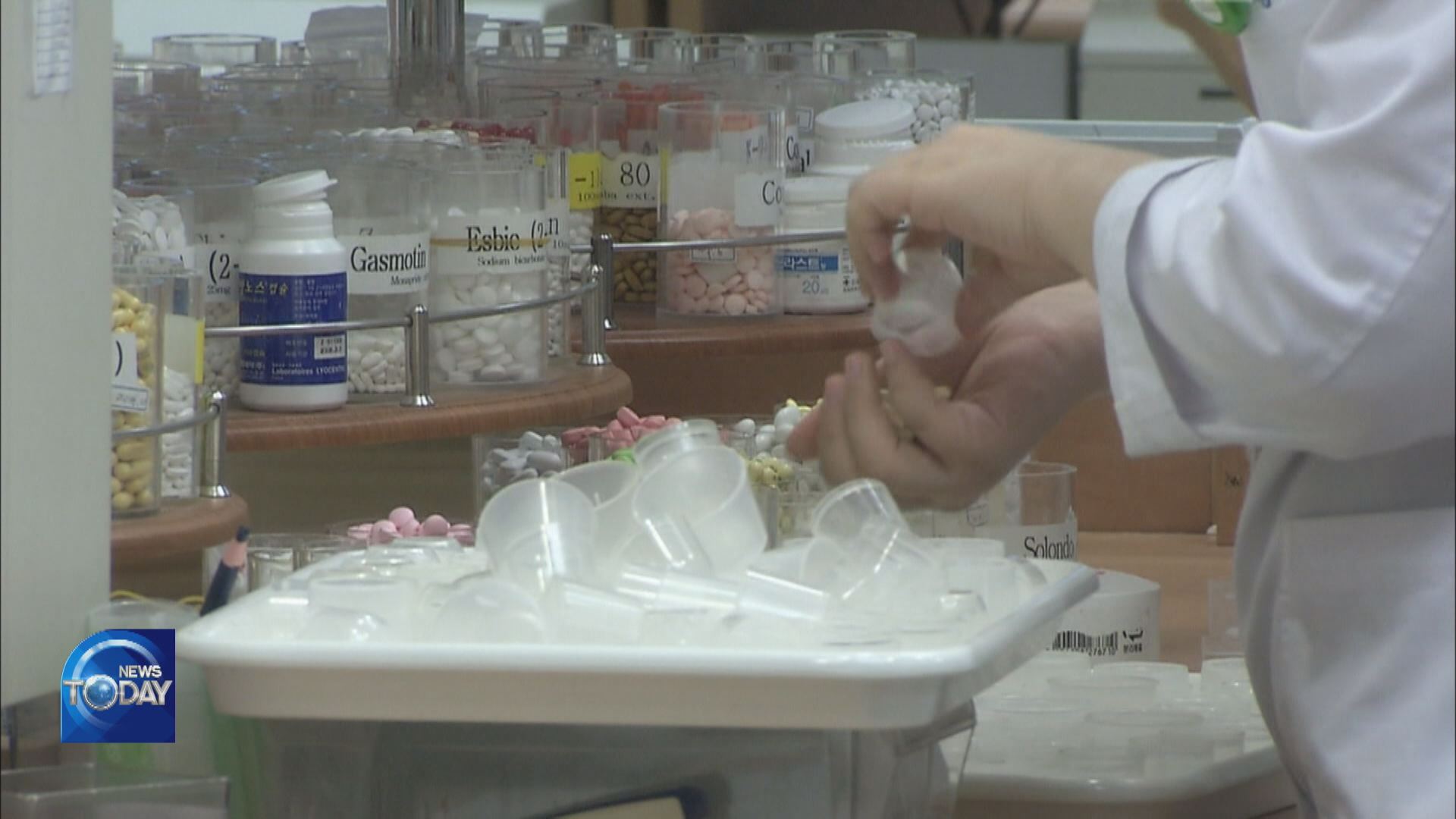BACTERIA RESISTING ANTIBIOTICS
입력 2022.08.08 (15:10)
수정 2022.08.08 (16:45)
읽어주기 기능은 크롬기반의
브라우저에서만 사용하실 수 있습니다.
[Anchor Lead]
Antibiotics are indispensable for treating bacterial infections. But bacteria that resist antibiotics are on the rise recently. Analysts say one of the reasons is the COVID-19 pandemic.
[Pkg]
This nursing hospital patient in his 70s was hospitalized at a university medical center with pneumonia. He was found to have been infected with bacteria that are resistant to multiple antibiotics.
[Soundbite] Prof. Kim Bong-young(Hanyang Univ. Hospital) : "Bacteria resistant to antibiotics have been found in the patient. They cannot be killed even by strong antibiotics like Carbapenem."]
Antimicrobial resistance often occurs when patients take too many antibiotics or stop taking prescribed antibiotics at their own discretion. A survey conducted by the Korea Disease Control and Prevention Agency has revealed more than 23,000 cases in which even strong antibiotics were unable to fight bacterial infections. That's nearly 30 percent more than a year ago. Analysts say the COVID-19 pandemic also contributed to the increase in antibiotic resistance. The U.S. CDC says 80 percent of hospitalized patients were prescribed antibiotics in the early stages of the pandemic, which only contributed to antibiotic resistance. The situation is not much different in Korea.
[Soundbite] Prof. Kim Bong-young(Hanyang Univ. Hospital) : "Pneumonia cased by COVID-19 is hard to tell apart from bacterial pneumonia. Doctors have a tendency to prescribe antibiotics even for viral pneumonia."
New drugs are needed to fight antibiotic resistance, but only one new antibiotic has been approved for use in the country. It's not covered by the national health insurance, making it less accessible.
Antibiotics are indispensable for treating bacterial infections. But bacteria that resist antibiotics are on the rise recently. Analysts say one of the reasons is the COVID-19 pandemic.
[Pkg]
This nursing hospital patient in his 70s was hospitalized at a university medical center with pneumonia. He was found to have been infected with bacteria that are resistant to multiple antibiotics.
[Soundbite] Prof. Kim Bong-young(Hanyang Univ. Hospital) : "Bacteria resistant to antibiotics have been found in the patient. They cannot be killed even by strong antibiotics like Carbapenem."]
Antimicrobial resistance often occurs when patients take too many antibiotics or stop taking prescribed antibiotics at their own discretion. A survey conducted by the Korea Disease Control and Prevention Agency has revealed more than 23,000 cases in which even strong antibiotics were unable to fight bacterial infections. That's nearly 30 percent more than a year ago. Analysts say the COVID-19 pandemic also contributed to the increase in antibiotic resistance. The U.S. CDC says 80 percent of hospitalized patients were prescribed antibiotics in the early stages of the pandemic, which only contributed to antibiotic resistance. The situation is not much different in Korea.
[Soundbite] Prof. Kim Bong-young(Hanyang Univ. Hospital) : "Pneumonia cased by COVID-19 is hard to tell apart from bacterial pneumonia. Doctors have a tendency to prescribe antibiotics even for viral pneumonia."
New drugs are needed to fight antibiotic resistance, but only one new antibiotic has been approved for use in the country. It's not covered by the national health insurance, making it less accessible.
■ 제보하기
▷ 카카오톡 : 'KBS제보' 검색, 채널 추가
▷ 전화 : 02-781-1234, 4444
▷ 이메일 : kbs1234@kbs.co.kr
▷ 유튜브, 네이버, 카카오에서도 KBS뉴스를 구독해주세요!
- BACTERIA RESISTING ANTIBIOTICS
-
- 입력 2022-08-08 15:10:40
- 수정2022-08-08 16:45:26

[Anchor Lead]
Antibiotics are indispensable for treating bacterial infections. But bacteria that resist antibiotics are on the rise recently. Analysts say one of the reasons is the COVID-19 pandemic.
[Pkg]
This nursing hospital patient in his 70s was hospitalized at a university medical center with pneumonia. He was found to have been infected with bacteria that are resistant to multiple antibiotics.
[Soundbite] Prof. Kim Bong-young(Hanyang Univ. Hospital) : "Bacteria resistant to antibiotics have been found in the patient. They cannot be killed even by strong antibiotics like Carbapenem."]
Antimicrobial resistance often occurs when patients take too many antibiotics or stop taking prescribed antibiotics at their own discretion. A survey conducted by the Korea Disease Control and Prevention Agency has revealed more than 23,000 cases in which even strong antibiotics were unable to fight bacterial infections. That's nearly 30 percent more than a year ago. Analysts say the COVID-19 pandemic also contributed to the increase in antibiotic resistance. The U.S. CDC says 80 percent of hospitalized patients were prescribed antibiotics in the early stages of the pandemic, which only contributed to antibiotic resistance. The situation is not much different in Korea.
[Soundbite] Prof. Kim Bong-young(Hanyang Univ. Hospital) : "Pneumonia cased by COVID-19 is hard to tell apart from bacterial pneumonia. Doctors have a tendency to prescribe antibiotics even for viral pneumonia."
New drugs are needed to fight antibiotic resistance, but only one new antibiotic has been approved for use in the country. It's not covered by the national health insurance, making it less accessible.
Antibiotics are indispensable for treating bacterial infections. But bacteria that resist antibiotics are on the rise recently. Analysts say one of the reasons is the COVID-19 pandemic.
[Pkg]
This nursing hospital patient in his 70s was hospitalized at a university medical center with pneumonia. He was found to have been infected with bacteria that are resistant to multiple antibiotics.
[Soundbite] Prof. Kim Bong-young(Hanyang Univ. Hospital) : "Bacteria resistant to antibiotics have been found in the patient. They cannot be killed even by strong antibiotics like Carbapenem."]
Antimicrobial resistance often occurs when patients take too many antibiotics or stop taking prescribed antibiotics at their own discretion. A survey conducted by the Korea Disease Control and Prevention Agency has revealed more than 23,000 cases in which even strong antibiotics were unable to fight bacterial infections. That's nearly 30 percent more than a year ago. Analysts say the COVID-19 pandemic also contributed to the increase in antibiotic resistance. The U.S. CDC says 80 percent of hospitalized patients were prescribed antibiotics in the early stages of the pandemic, which only contributed to antibiotic resistance. The situation is not much different in Korea.
[Soundbite] Prof. Kim Bong-young(Hanyang Univ. Hospital) : "Pneumonia cased by COVID-19 is hard to tell apart from bacterial pneumonia. Doctors have a tendency to prescribe antibiotics even for viral pneumonia."
New drugs are needed to fight antibiotic resistance, but only one new antibiotic has been approved for use in the country. It's not covered by the national health insurance, making it less accessible.
이 기사가 좋으셨다면
-
좋아요
0
-
응원해요
0
-
후속 원해요
0












![[단독] 김민석 총리, 취임 첫 일정으로 ‘송미령 반대’ <br>농민단체 농성장 방문](/data/news/2025/07/03/20250703_YUTdgQ.png)




이 기사에 대한 의견을 남겨주세요.